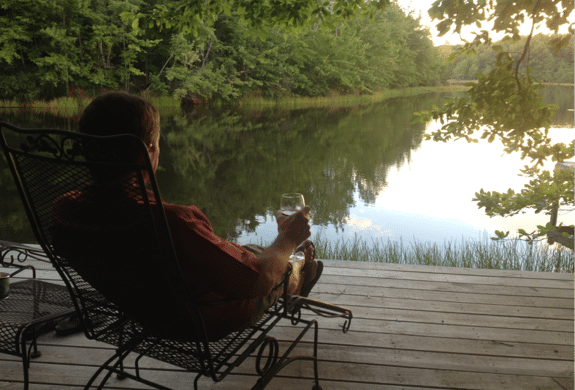6 Steps I Took to Prepare
Earlier this month, my wife Gail and I took a much-needed vacation. We rented a house on a lake in the mountains near Monteagle, Tennessee. We were there for two weeks.
After my book launch and our daughter’s wedding, we were both feeling the need to get away. We wanted a place where we could rest, reconnect, and refill our spiritual and emotional tanks.
As a prerequisite to this time away, I decided to completely unplug from e-mail and social media. I wanted to experience a complete “digital detox.”
The evening before I left:
- I deleted all the social media applications from my iPhone. This included HootSuite, Google+, and Facebook. I planned to simply reinstall them after my vacation.
- I disabled all my e-mail accounts except for one. I set up a special “urgent” account that my colleagues could use in an emergency. If there was something I needed to see, I instructed them to text me, then send a message to this account.
- I made an announcement on my blog. I told my readers that I would be offline in order to set their expectations.
- I set my out-of-office messages. I did this on my e-mail accounts and also in my Twitter bio. I let people know that I was on vacation and offline. I gave them instructions about what to do if there was an emergency.
- I closed my social media pages in my web browser. This took discipline, because I still wanted to have access to the Internet for reading and research. Thankfully, this didn't prove to be a problem.
- I gave authority to my team to act in my absence. I gave them the perimeters and told them I would support any decisions they made while I was away.
Being unplugged went surprisingly well.
During the first twenty-four hours, I found myself compulsively starting to check my e-mail and social media accounts. I often do this when I am waiting for anything—stopped at a red light (I know, I know), standing in line, or in between projects. But I caught myself, didn't check, and eventually stopped checking.
Almost immediately, I saw my attention span increase. Gail and I spent every morning being quiet, reflecting, and journaling. We did a lot of reading. I didn't feel the usual hurry-up and-finish pressure I experience in my normal life.
Gail and I had several incredible conversations. Without the distraction of e-mail and social media, we were able to focus and dive deeper in our discussions. We were really able to reconnect. We just enjoyed being with one another. (We also celebrated our thirty-fourth anniversary!)
Overall, I felt a huge sense of relief—kind of like when you are in a noisy restaurant and then step outside to a quiet night. I didn't realize how noisy my environment had become. As the first few days passed, I felt the stress drain from my body and my psyche.
I did have one situation that required me to get back online for about twenty-four hours. As you may have read, HarperCollins closed its acquisition of Thomas Nelson. This required a board meeting and some follow-up calls. But it was soon resolved, and I went back offline.
My biggest take-away from these two weeks is that I need more margin in my life. This is something I've known for a while. I've even written about it. But I am determined to be more intentional about it.
Since being home, I have continued to journal every morning. I am also saying No to additional commitments, so I can make sure I have time for those priorities that matter most. I feel like my tank is full again.
If you haven't ever deliberately unplugged for a specific period of time, I encourage you to do so. Even if you can only manage forty-eight hours, it's worth it. Trust me, you need it more than you think. We all do.
Disclosure of Material Connection: Some of the links in the post above are “affiliate links.” This means if you click on the link and purchase the item, we will receive an affiliate commission. Regardless, we only recommend products or services we use and believe will add value to our readers. We are disclosing this in accordance with the Federal Trade Commission’s 16 CFR, Part 255: “Guides Concerning the Use of Endorsements and Testimonials in Advertising.









